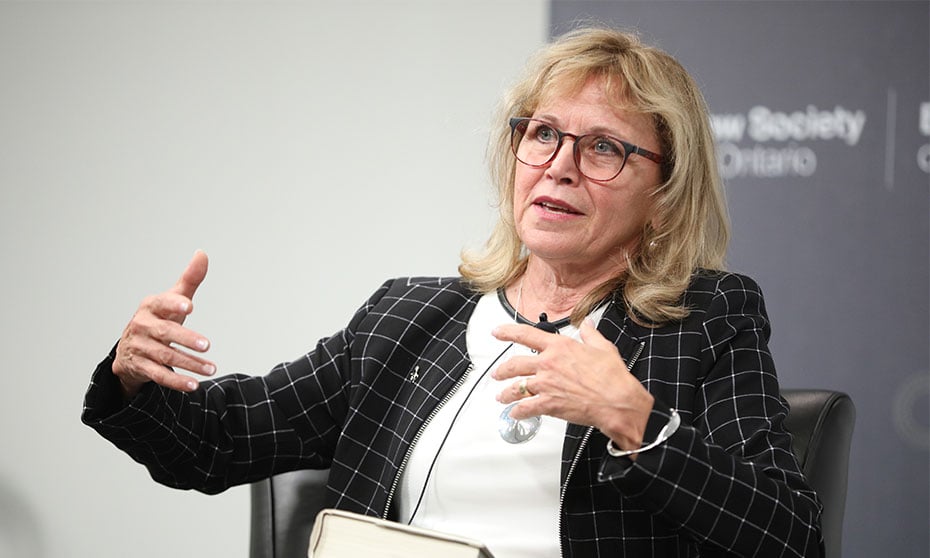
Lawyer Jean Teillet spoke at the Law Society of Ontario

Lawyer Jean Teillet says Canada’s legal history underpins many of the issues in her new book on the history of the Métis Nation.
“I’ve been a Métis rights lawyer for almost 30 years, and I’ve done dozens of Métis trials now,” Teillet said at the Law Society of Ontario in Toronto at a Sept. 18 event about her book, The North-West Is Our Mother: The Story of Louis Riel’s People, the Métis Nation.
As a lawyer, Teillet said she would commission reports from historians or anthropologists, who would respond with “17 binders of information” on Métis history and culture, none of which was published anywhere except deep within the court record.
“Being the defence lawyer, I read them all,” she said.
Equipped with the legal knowledge, plus years of documents about her family history, Teillet said she found other legal connections through her research.
“You could write this whole history as a history of law in this country. My grandfather became a notary public so he could go out and swear affidavits,” she said. “It’s obvious they believed that having a sworn statement meant more than just collecting someone’s story in a document somewhere.”
A lawyer also played a key role in bolstering Louis Riel’s activism, said Teillet.
“It’s 1869, Louis is 25. And yes, he has a good education from Montreal but it’s a seminary education,” she said. “He did work in a law office briefly, but that’s about it. But here they are engaged in a very legal argument about whether Canada has the right to take over the people in the west without their consent.”
Riel’s lawyer came to Canada from the U.S. and was born without legs — notable, she said, since the pair lived in an area where horses were sometimes the only way to get through the snow that covered the ground for half the year.
“I’ve read his almost verbatim trials and testimonies and he’s brilliant,” she said of the lawyer. “It’s not like there’s the Queen’s Press out in Red River or looking anything up online. When they are crafting their arguments about whether they are coming into confederation or not, there is legal thinking — big legal thinking — going on.”
Teillet said that one thread that runs through Métis history is their role as treaty negotiators. She noted that cultural understanding of the Métis Nation — such as their high levels of mobility — is needed in the modern court system.
For example, the event’s moderator, Justice Todd Ducharme, asked Teillet about R. v. Powley, 2003 SCC 43.
“I think all of us do this when you’re practicing the law. You want to win your case and you have to craft it on the facts before you,” she said of the decision, which analyzed whether members of the Métis community in and around Sault Ste. Marie had an aboriginal right to hunt for food that is “infringed without justification” by the Ontario hunting legislation.
“That became the fact pattern on which the Supreme Court created its test,” she said. “But then you have the buffalo hunters who are travelling hundreds, thousands of miles a year — the test is inappropriate. Their territories are much larger. The test now is like an anchor around our necks. It is unhelpful to the extreme.”
A question from the audience also raised Daniels v. Canada (Indian Affairs and Northern Development), 2016 SCC 12, and Teillet said she was very disappointed with the “damage” done by the courts.
“I don’t think the courts should be defining indigenous peoples. That’s an inherent right to determine who you are,” she said. “All they had to do is say that Métis are within federal jurisdiction and walk away.”
Despite the legal issues facing Métis rights lawyers and their clients, Teillet said there has been progress working with the government on these issues over the past four years. Teillet said she hopes the election won’t affect the “foundational” shifts that have occurred.
“The whole point of having constitutional rights for indigenous people is that they are not so subject to political whims,” she said.